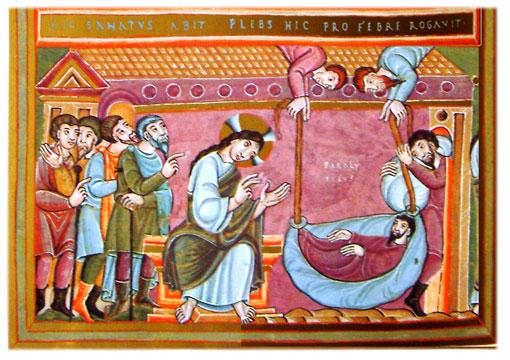Memorial, St Anthony of Egypt (17 Jan 2020)
Homily of Fr. Paul Panaretos, S.J., Full Spiritual Exercises
“God’s Inworking” for Us
St. Anthony of Egypt figured at the start of monastic life. He was one of many who withdrew to the desert to enjoy solitary lives. The gospel words, Go, sell and give to the poor, Anthony took literally, as though he were to do nothing else. Even hermits are not antisocial. Others hermits prevailed on Anthony to create a network of their scattered cells. Like Francis of Assisi Anthony was wary at first; he did it and monastic life began to emerge.
 He also drew many to him—like Francis of Assisi, and 20th-Century Thomas Merton. Anthony’s vocation touched others. When persecution of Christians re-emerged, Anthony supported prisoners and risked his life. Nearly 30 years later Anthony opposed the heresy of Arius. His contemporary, Athanasius, recalled Anthony had a vision that the Arians kicked “like a herd kicks when it leaps in confusion.”1 Antony could not stand by idly.
He also drew many to him—like Francis of Assisi, and 20th-Century Thomas Merton. Anthony’s vocation touched others. When persecution of Christians re-emerged, Anthony supported prisoners and risked his life. Nearly 30 years later Anthony opposed the heresy of Arius. His contemporary, Athanasius, recalled Anthony had a vision that the Arians kicked “like a herd kicks when it leaps in confusion.”1 Antony could not stand by idly.
Others recalled that “certain philosophers asked [Antony] how he could spend his time in solitude without the pleasure of reading books, he replied that nature was his great book, and amply supplied the want of others.”2 That caused me to think about and pray for you. Why? Because we invited you to begin with God’s creation. The Catechism reminds us: “Scripture and Tradition never cease to teach and celebrate this fundamental truth: ‘The world was made for the glory of God.’ St. Bonaventure explains that God created all things ‘not to increase his glory, but to show it forth and to communicate it.’”3
We can say our triune God loves us so much that God gives us all created things personally to communicate to us, to welcome our personal relationship with God. To crown our relationship God became human for us in Jesus. Relationship with God returns us to St. Anthony.
Practical moral thinkers visited Anthony to mock him and his faith. They preferred logic and “demonstrative arguments.” He asked them, “which is better, faith which comes through the inworking (of God) or demonstration by arguments?’ …they answered that faith which comes through the inworking was better and was accurate knowledge…Antony said, ‘You have answered well, for faith arises from disposition of soul. …[God’s] inworking through faith is better and stronger than your professional arguments.’”4
Practical moral thinkers visited Anthony to mock him and his faith. They preferred logic and “demonstrative arguments.” He asked them, “which is better, faith which comes through the inworking (of God) or demonstration by arguments?’ …they answered that faith which comes through the inworking was better and was accurate knowledge…Antony said, ‘You have answered well, for faith arises from disposition of soul. …[God’s] inworking through faith is better and stronger than your professional arguments.’”4
St. Ignatius of Loyola urged people to let God work personally, intimately, directly with them. Ask St. Anthony to intercede for you and to help you to trust him, St. Ignatius, your patron saints and reveal how abundantly and lovingly the Trinity creates and sustains you.
___________
- Life of Antony, 82.
- Butler’s Lives, online excerpt.
- Catechism of the Catholic Church 293.
- Life of Antony, 77.
___________
Wiki-images by: Dosseman St. Antony of Egypt CC BY-SA 4.0; Jesus healing paralyzed man PD-US

No comments:
Post a Comment